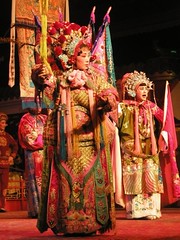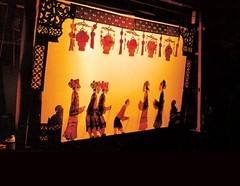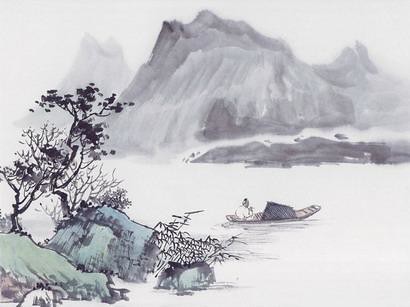| Home > Living in China > Art |
Magic Face Change is Soul of Sichuan Opera
 |
|
Sichuan Opera, Chengdu |
It is said that ancient people painted their faces to drive away wild animals. Sichuan Opera absorbs this ancient skill and perfects it into an art.
Face changing is the highlight of Sichuan Opera.There are three types of face changes.
In the Wiping Mask routine the actor applies cosmetic paint in a certain position on his face. If the whole face is to be changed, the cosmetic paint is applied to the forehead or eyebrows; for changes on the lower half of the face, paint is applied to his cheeks or nose; or to other specific parts.
The Blowing Mask routine works with powder cosmetics, such as gold, silver, and ink powders. Sometimes a tiny box is placed on the stage; the actor draws near and blows at the box. The powder will puff up and stick to the face. Sometimes the powder is put in a cup. The secret to success in this act is to close the eyes and mouth and to hold the breath.
The Pulling Mask routine is the most complicated. Masks are painted on pieces of damask, well cut, hung with a silk thread, and the lightly pasted to the face one by one. The silk thread is fastened in an inconspicuous part of the costume. With a flick of his cloak the performer magically whisks away the masks one by one as the drama develops.
One Sichuan Opera master also used qi gong movements as he changed face color from red to white, then from white to black.
Face changing is a magical art. Actors change more than 10 masks in less than 20 seconds! By raising the hand, swinging a sleeve or tossing the head, an actor uses different masks to show different emotions, expressing invisible and intangible feelings through visible and tangible masks. From green to blue, red, yellow, brown, black, dark and gold, these masks show fear, tension, relaxation, slyness, desperation, outrage, and so on.
Sichuan Opera master Peng Denghuai changed 14 masks in 25 seconds, and reverted to four masks after revealing his true face. This was his latest Guinness World record, breaking his previous one. Hong Kong super star Andy Lau was said to respect Mr. Peng as teacher and mentor in this stunt.
Today hi-tech is used to enhance this traditional art. Lasers and twinkling lights add a touch of mystery. And modern faces like Zorro are invited to the stage.
Sichuan Opera, like hot-pot and other Sichuan cuisine winners, is exciting, rich and good-natured.
Source: Travel China Guide
Art
 more
moreMagic Face Change is Soul of
Sichuan Opera, ChengduSichuan Opera (Chuan

Shadow Play still Popular in Some
Shadow play, a traditional Chinese folk art with a history of more

Origin and Tools of Ink & Wash
Ink and wash painting is an East Asian type of brush painting, also

Customs
 more
moreChinese Kungfu
Common Styles of Chinese Martial Arts
China has one of the longest histories of continuously recorded
Origin and Development of Wudang Martial Arts
According to the legend, Zhang Sanfeng is the originator of the
Introduction to Wudang Mountains
The Wudang Mountains, also known as Wu Tang Shan or simply Wudang,




 print
print  email
email  Favorite
Favorite  Transtlate
Transtlate 
